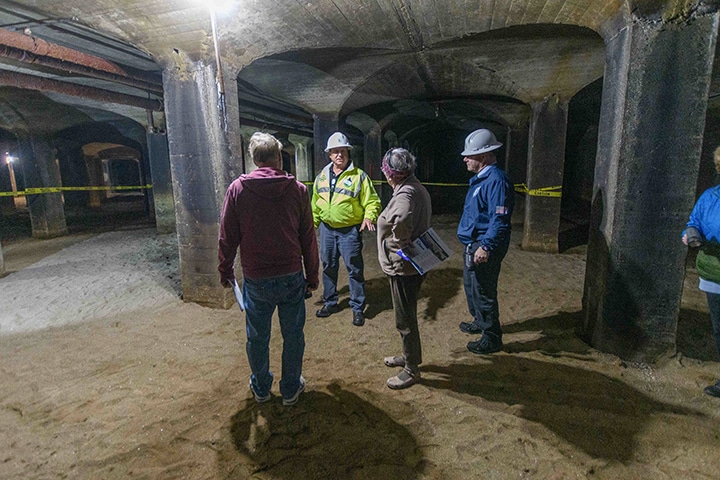Process control manager Alex Roseweir speaks with visitors in the underground slow filter chamber during the West Parish Water Treatment Facility open house on Oct. 16 in Westfield.
Reminder Publishing file photo
SPRINGFIELD — The Springfield Water and Sewer Commission received $4.47 million in loan forgiveness from the Massachusetts Clean Water Trust Drinking Water Revolving Fund for the new West Parish Water Treatment Plant.
According to the SWSC, the loan forgiveness is tied to a $15 million competitive low-interest loan awarded to the commission for the project in 2023, when it was the top-ranked drinking water project on the Clean Water Trust’s 2023 Intended Use Plan.
“We are grateful to the Massachusetts Clean Water Trust for their partnership and support of this regionally critical project,” said SWSC Executive Director Josh Schimmel, in a statement. “The commission has worked continuously to secure the lowest-cost financing and grant funding whenever possible for this project in order to reduce the burden on ratepayers, and reflects our sound financial management.”
The commission broke ground on the new West Parish Water Treatment Plan project in October with several public officials on hand, including U.S. Sen. Ed Markey (D-Malden), Springfield Mayor Domenic Sarno, U.S. Rep. Richard Neal (D-Springfield), state Reps. Carlos Gonzalez (D-Springfield) and Orlando Ramos (D-Springfield) and Springfield Water and Sewer Commission Chair Vanessa Otero.
The project, which will cost a total of $300 million, is designed to significantly upgrade and modernize the facility, and is backed primarily by $250 million in low-interest loans from the Environmental Protection Agency and MassDEP’s Massachusetts Drinking Water State Revolving Fund, as well as a $4.6 million federal earmark secured by Markey, Neal and U.S. Sen. Elizabeth Warren (D-Cambridge). The loan through the EPA’s Water Infrastructure Finance and Innovation Act, Markey noted, was made possible by the Bipartisan Infrastructure Law signed by President Joe Biden in 2021.
“Together, we’re going to embark on what is arguably one of the largest public infrastructure projects the Greater Springfield region has seen this century,” Markey said about the project.
The commission previously received $5.9 million in loan forgiveness from the Clean Water Trust for Phase 1 of the project, which included construction of a new backwash facility that was completed in 2023.
The $4.47 million in loan forgiveness is part of “Phase 2B” of the project, according to the Massachusetts Clean Water Trust, and will be awarded upon the project’s completion in 2028.
Construction of the plant is expected to ramp up in 2025.
“The project involves constructing a water treatment plant with advanced processes such as coagulation, flocculation, dissolved air flotation, and filtration to replace the existing direct filtration and slow sand filtration system,” reads the project summary from the Trust. “DAF process will enhance the removal of natural organic matter, ensuring compliance with disinfection byproduct and maximum contaminant levels.”
During the groundbreaking in October, officials spoke to the importance of maintaining a clean water supply in the interest of public health.
Neal referred to it as the bedrock for extended life expectancy. He lauded the EPA’s continued support of clean water initiatives and stressed the role entities like the Springfield Water and Sewer Commission in preserving quality of life.
“When you look at Flint, Michigan, and you compare and contrast what happened there when they decided to go to private water supply systems,” he said, referring to the 2014 public health emergency related to lead contamination in the water supply and Legionnaires Disease, “we have not had that experience because this is based upon a commitment that we made to the citizenry and the taxpayers to accomplish these moments.”
The Springfield Water and Sewer Commission is responsible for providing clean water to more than 250,000 people in Western Massachusetts, including more than 36,000 Springfield households.
The new facility will be able to treat 65 million gallons of water per day in service to Springfield as well as the commission’s retail customers in Ludlow and wholesale customers in Agawam, Longmeadow and East Longmeadow. Westfield, Southwick, West Springfield, Chicopee and Wilbraham are all also peak and/or emergency users of the system.


